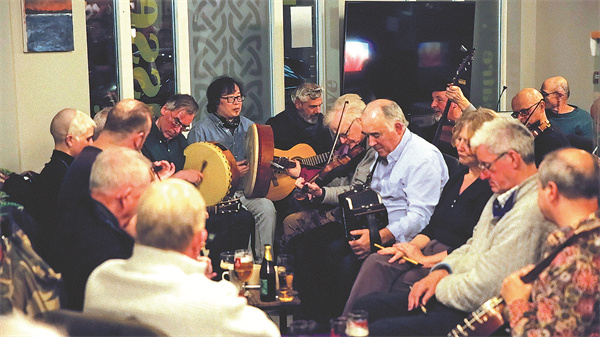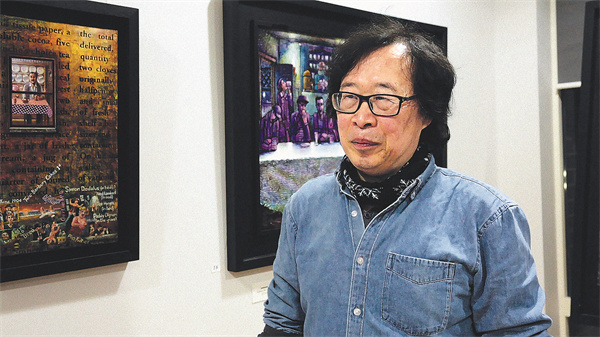
Chinese musician Li Yan (center) is part of the regular Friday night session at the Irish Cultural Centre in London.[Photo provided by Brain Chang/China Daily]
China and Ireland may be more than 8,000 kilometers apart and vastly different in geography and demographics, but there are some things that bind the two countries.
Both are famous for their expat communities and the food and drink culture they have spread around the world.
Both are renowned for their artistic heritage and, when it comes to music, the sounds of Ireland hold a particular fascination for China.
An example of this is 65-year-old Li Yan, who is originally from Beijing and lived in Zhangjiakou in Hebei province, Jinzhou in Liaoning province, Luoyang in Henan province, and Guangzhou in Guangdong province, before settling in London where he is part of the city's vibrant Irish music scene.
His instrument of choice is the bodhran, a cross between a tambourine and drum that is a vertically held goatskin instrument played with a "tipper", a small, double-ended drumstick, that is an essential element of traditional Irish music.

Musician Li Yan.[Photo provided to China Daily]
On Thursday nights, he can be found in an Irish pub in Kingston along the Thames playing with a group called Hungry Grass in sessions held as social music gatherings found around the world wherever there are Irish communities.
A session leader manages musicians playing instruments such as the guitar, flute, violin — or "fiddle" in the session culture — tin whistle, accordion, and bodhran. The session leader suggests tunes and leads the playing or singing.
On Friday nights, Li is a regular and popular member of another session at the Irish Cultural Centre in Hammersmith.
"My background is being a poet, not a musician," he tells China Daily. "In China, I had a Canadian English teacher called Glen Allen, who introduced me to Irish culture, particularly its writers.
"When I came to London, I saw Hungry Grass play and was attracted to their songs' stories. I wanted to translate them, but realized that to present the words the right way, I must have some basic musical knowledge. With lyrics, it's not about the straight translation of words, they have to sit right with the music."
As with many Irish stories, the turning point came in a pub.
"Once, I was listening to Hungry Grass and started drumming on the table. An old Irishman told me I was doing it all wrong and I should learn how to play Irish music properly, so I looked up bodhran classes and found the Irish Cultural Centre."
Dublin-born Philip Cashin is the founder and leader of the Friday night session group that performed for King Charles when Li visited the cultural center in March 2022.
He tells China Daily how highly he rates Li's musicianship.

See more by scanning the code.[Photo provided to China Daily]
"When he first appeared, I was astonished," he says. "He started to sing a Gaelic song in Chinese, and he did it perfectly. I thought 'This is special, very special'."
Former all-Ireland under 16 fiddle champion Ben Gunnery has traveled the world with numerous productions including extensively touring in China, and has played on movie soundtracks including The Lord of the Rings, The Hobbit and Harry Potter.
"Whenever I play a session, I tell everyone else to shut up when Li starts singing because it's magical," he says.
Li is not the only person building this cultural connection.
Hulusi (gourd flute) player Jaylin Chu has found online fame playing Irish music, even moving to Ireland to do a master's degree after being inspired by the global sensation Riverdance as a teenager.
The world of academia is also doing its bit. In July 2024, the Confucius Institute at the University College Dublin hosted a performance by the Jinan Children's Folk Ensemble, after which the youngsters were taught the basics of traditional Irish dancing.
The following month, music students from Southwest University in China spent two weeks at the Irish World Academy of Music and Dance at the University of Limerick, strengthening a cultural connection that predates China and Ireland's diplomatic links.
Leader of The Chieftains, a traditional Irish music group, Paddy Moloney built connections by inviting the Tianjin ensemble of Chinese musicians and dancers to play with at Dublin's National Concert Hall in the 1980s.
This paved the way for their historic visit in 1983, where The Chieftains performed in Suzhou, Shanghai, and on the Great Wall of China at Badaling in Beijing. The tour finale in Shanghai was televised to an audience of 700 million people.
In the group's official biography, Sun Shen, then vice-chairman of the Musician's Association of China, was quoted: "I think through The Chieftains' music, I have seen the images of the Irish people. Music knows no boundaries for it is a unique and comprehensive language."
Two years later, The Chieftains released an album inspired by the trip, incorporating instruments from both musical cultures.
A decade later, in 1994, there was another moment of creative connection when the Riverdance phenomenon launched an updated version of traditional Irish dancing on the global stage. The troupe performed on the Great Wall in 2003, and was warmly welcomed across China.
Last winter, Riverdance's 25th-anniversary tour included a nine-week visit to China, covering 25 cities. Its rival show Lord of the Dance, established by Riverdance creator Michael Flatley, has also proved hugely popular, first in Beijing in 2004 and being part of the opening gala of the Beijing International Horticultural Exhibition in 2019.
"We have a long drumming tradition in China going back to ancient times, so when I hear the bodhran, it feels like part of that tradition," Li says. "There is also the poetry. China is a country with a great history of poetry, but in Ireland, poetry feels more current. We have age-old poetry books in China, and when I hear Irish songs, it feels like someone is bringing their spirit to life.
"A lot of people in China love Irish music and are interested in what I do," he says. "I've been going down my Irish path for a long time. Now we're on a musical journey together."